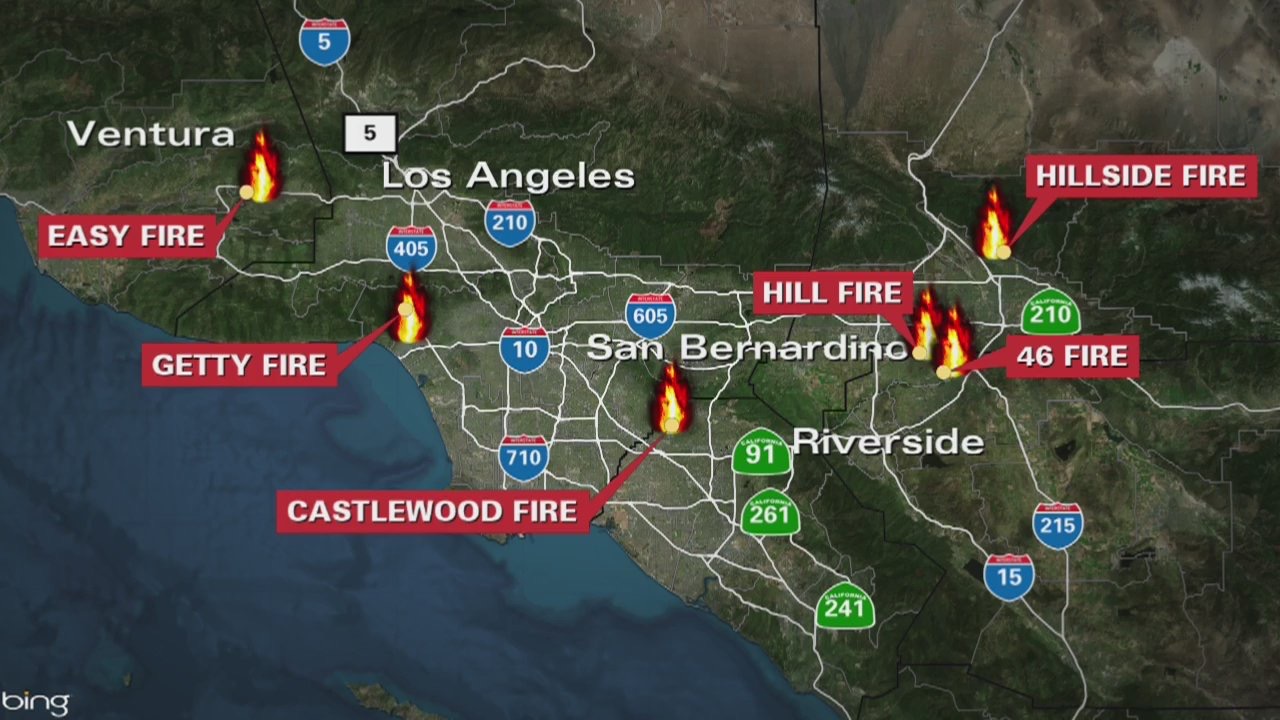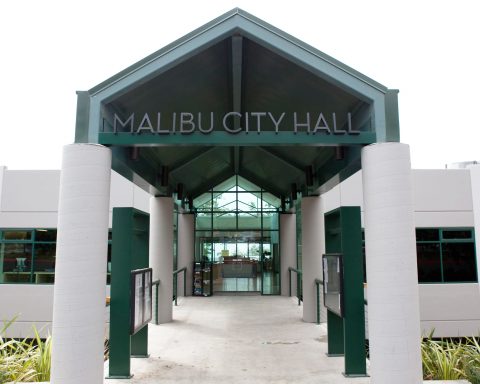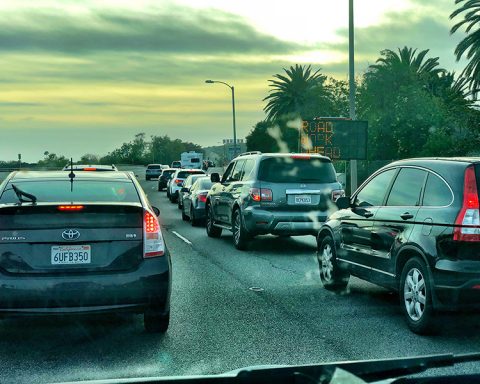Editor’s Note: Hold the presses. Sometimes a small thing reveals something bigger. The article below is about the Citys and Sheriff’s mishandling of the recent blackout and it stands on its own. But in the process of writing it, I also spoke to someone of significant stature at the City and learned that while the shortcomings chronicled here are of note, when we talked about the lack of preparation and coordination, I mentioned that I assumed that at the very least, a new overall Malibu evacuation plan was in place. There had been, after all, written up and published in the newspaper co-authored by a City Councilmen. I mean, right? I mean not possible we could be sitting here in fire season without such a plan, right? Well, in the same way the City wasn’t prepared for Woolsey, and wasn’t prepared for the Thursday/Friday blackout after the Getty and Easy fire, it turns out, as you’ll see at the end of this article, much less has been learned than you would expect.
By Paul Taublieb, Special for The Local
Before proceeding, I have a confession. The events that unfolded as laid out as follows were not undertaken as a journalistic effort. When I spoke to the various parties, including our erstwhile city manager and a number of people in the sheriff’s office, my desire was strictly to address a possible life-and-death situation. I didn’t set out to doanything, let alone write an article – there was just what I felt was a pressing need to try and rectify a situation which seemed truly dangerous. So I didn’t identify myself as a journalist as my concern was the situation, not protocols, and it remains as such now, and it feels simply more responsible to recount my experience of last week than let it go unsaid and possibly unaddressed for the inevitable next time something similar, or worse, occurs. And if my actions during these events, from impatience to annoyance, were more charged than professional, it was only out of concern and from a tonal or attitude perspective, I extend my apologies. But I could not, in good conscience, not share.
Like most folks, when the power went out on Thursday evening, it didn’t seem awfully dramatic – particularly after the live heat and chaos of Woolsey – more of a somewhat mysterious inconvenience than an earth shattering event. After all, there was no actual fire threat, not even a hint of a voluntary evacuation, and since the blackout area was relatively small, it sure seemed like power would be coming back quickly. It just didn’t seem like much of a big deal or life-threating situation. At least not initially.
And since last year’s maelstrom I had bought a generator and some supplies (thanks to some advice from David Saul who does emergency consulting, I might add), so felt somewhat snug and comfortable, the food was still cold and the lights were on.
Until, that is, I took to the road late Thursday afternoon and approached the intersection of PCH and Paradise Cove.
Ever watch a NASCAR race when they go 3 or 4 wide into a turn and you hold your breath because you can see the dominoes falling into what looks like an almost certain giant wreck?
At the un-stop lighted intersection a man, seemingly heading to work at the Cove, was on the east side trying to get across to the beach side. A car had politely, and per the law, stopped at the dead-eyed stoplight and was waiting for the man to cross. You see, as the City had pointed out in an email earlier that day, or as this person may have remembered from his driver’s test as a teenager, you’re supposed to treat a blank street light like a stop sign.
Suddenly, in what looked like the start of choreographed car crash scene from the unannounced, upcoming movie “Fast & Furious 17: Mayhem in Malibu”, one car slammed on the breaks to avoid hitting the stopped car, the vehicle behind swerved to miss that car, and the car ahead of me locked up its breaks, all happening in the southbound lanes. In the northbound lanes, the poor pedestrian dashed back to safety like Wiley E. Coyote, diving to the safety of the shoulder, barely missing getting flattened. But since this wasn’t a cartoon he wasn’t going to humorously go from pancaked to reanimated.
Luckily, amazingly, death, mayhem and a murderous maelstrom was avoided.
I was, I can admit, shaken. And pissed. It had been close to 20 hours since the lights went out and nobody was doing anything to manage the traffic at what I would later learn was three, maybe four stoplights total. Well, the City had sent out an email saying to stop at a dead stoplight – which might have been why one kind motorist was sitting there like a metal duck in a shooting range, following the rules, and giving the poor pedestrian a false sense of confidence as a stretch of PCH had been turned into the Autobahn.
Something had to be done so I called the City as I continued down PCH (on my way, btw, to the great Michael Laden Anderson’s 4 pm CrossFit class – this is an unabashed, unsolicited plug). I explained I had just witnessed a near catastrophe and needed to speak to someone right away. This led me to being transferred to a series of voice mails, with me calling back each time to explain I needed to speak to a live, real person right away. Finally, I was put through, without anyone asking my name, to the City Manager’s office and Reva Feldman picked up.
If there was frustration or aggravation, in my voice, I would not be surprised. I had not only witnessed what could have been a tragedy but felt I had only barely avoided being part of it myself. And that I knew the same danger still loomed, unaddressed, so demure politeness or journalistic detachment, were not my priorities.
I explained the near catastrophe I had witnessed, and without a word of apparent concern, I was summarily informed that “We have nothing do with PCH,” and if I recall her precise words, (I was driving) “that is the responsibility of the Sheriff and CalTrans and nothing to with the City.” I asked if the City could put out temporary stop signs or assign someone to do traffic control, or maybe use generators to fire up the stop lights, and was told, in a dismissive tone, no, there would be liability on the City’s part if they did that, ignoring the fact the City had an issued an email warning telling people to stop at dead stoplights, and all I was asking was just the virtual version of the same thing. I pointed this out to no avail. Perhaps even though I hadn’t been asked my name, nor offered it, she recognized my voice from the time I interviewed her immediately post Woolsey, and since I’ve been critical of her in my writings since, that would explain why she was brittle and curt, and if it was personal to me and by design. I don’t know. Frankly, it doesn’t change the facts.
Then I asked when was the power coming back on, anyway? She said, “I called SCE at 10 am” – (the power had been out since 8:45 pm the night before, 18 hours before her call, and I might add, I’m assuming she got around to inquiring about the return of power an hour after she got to work that day) “and they told me it would be a couple of hours.” Well, I pointed out, it was now nearly 4 pm, to which she replied, “Do you want me to call back and get an update?” I opined that would be a good idea.
But clearly with the City prepared to do nothing, and vividly imagining the next automobile-cum-pedestrian pas de deux at a local intersection resulting in a different and deeply tragic outcome than the near-miss I witnessed, I called Lost Hills sheriff department. I’m sure my tone was as frustrated, agitated, if not more so, and again for anyone I may have offended, I apologize.
Their response was the city could have indeed manned the intersections if they trained personnel (and I’m told the police volunteers have that, but I’m not sure why they weren’t deployed – later I was told they were busy addressing other fire-related problems, if not identified) and yes, I was told, the city waswithin their rights to put up temporary stop signs, liability since they would only be enforcing existing laws.
I also asked whether the Sheriff would please send someone out – couldn’t someone man the intersections? The officer said, “We’ll try.” I took the liberty of quoting Yoda, “There is no try, only do.” He chuckled and said he would make it happen, and I later learned officers shortly appeared. A coincidence, maybe.
(I also later learned that just a week or two ago, the City authorized the purchase of generators to power stop lights in this exact scenario, but the protocols, I’m told by a council person, for installing them is quite complex in terms of dealing with SCE and Cal Trans, and those hadn’t been worked out yet. Seems quite odd to me that a year after the fire this would be an open question, but I was told the wheels of inter-agency communication and coordination turn very slowly and supposedly beyond the city’s ability to do it more expediently.)
Armed with the knowledge that the city could do something, e.g. put stop signs, or assign volunteer policemen if they had been trained in traffic control, I called the City back and this time asked to speak to Reva, and I was asked my name. I had a feeling the call might go differently, since as some of you may know, thanks to our editor-in-chief Cece Woods, I have written about the City and fire machinations and failures before, even if I had no idea whether Reva actually read any of my scribblings or even knew my name. Looking back, her terseness was equal to the first conversation, so maybe she did ID me in our first call, or maybe she’s just consistent in her condescending, imperial manner when talking to a lowly constituent. Can’t say, but she seemed even more condescending and imperial, along with defensive, on the second call.
But whether by voice alone and certainly by name, yeah, she knows me. And oh yeah, Cece Woods, too.
I tried to inform her that she was wrong. I may have particularly direct. I was trying to get her to act because the power was still out and the lights were still dead, the roads perilous. I was not in the mode of even-keeled journalist. I was frustrated, still a bit shaken up, and perhaps particularly direct in mu tone and approach as having just been educated by the sheriff as to what actually could be done. – and with the electricity and lights still out and the near pile-up still fresh in my mind – getting something done, not hearing explanations of excuses, was my goal. In my business life as a documentary filmmaker I often wear two hats – the sensitive, introspective sort as a director, but also a producer where if one can’t get around the brick wall to get something done, then going through it is an acceptable option. I was dealing with a bureaucratic brick wall.
What I was trying to inform her was not my opinion nor was it politicized or in any way personal – but it was an attempt to knowledge based on what multiple people in the Sheriff’s office had told me, which happened to be in direct opposition as to what Reva had stated, believed and now was trying to defend. It was frustrating – what she didn’t seem to want to hear is that, in fact, she and City had the ability to act – to take the simple, logical and particularly difficult step of put up temporary stop signs or having qualified people man the intersections and direct traffic.
However, this was like talking back to your parents. Right or wrong, they hold the floor and you don’t talk back. Or more accurately, like trying to talk explain to the school principal how he or she was wrong. Perhaps it was my tone, perhaps it was the obvious fact she was wrong, or perhaps she simply wasn’t going to believe me or was comfortable holding on to her erroneous assumptions, but refused to listen. I don’t know. But she was not having it.
Reva is ostensibly a “public servant” (I suspect she hates that description, if I may editorialize) paid by my/our taxes, e.g. she works for me and you, which if you had been listening on the call, you would not surmise from her short-tempered, schoolmarm, I’ll-tell-you-what’s-up tone of voice. I don’t think her being dead wrong helped.
After all, whether I was demure about communicating this or not – and I am not by nature soft-spoken – on top of my mind electricity was still out and traffic was cavorting uncontrolled through a number of Malibu intersections where my friends, neighbors and their children were driving. And there were things Reva could do about it. But she was not about to listen to me. As she attempted to insist there was nothing she could do, I interrupted – again this was an agitated, concerned citizen, not a journo –
It appears that hearing the opposite of what she believed, or maybe dug-in and defending per position no matter what, but my attempt to enlighten her didn’t fly.
But she did have a final, sweet bon mot to share: Interrupting my effort to tell her, again, what the sheriffs had informed me (and as I would learn later was confirmed), that there were indeed, things she could do, she spit out, “Well, at least you and Cece Woods have figured out how to run the city.” Then click – boom – bang – she hung up on me.
All’s well that ends well. Power came back on and as far as I know, there were no incidents at the dead traffic lights. Kind of like what Reva told me when I asked her about the City’s management of the evacuation during Woolsey, which saw a five-hour traffic jam to get to Santa Monica. “We did a great job, nobody died,” she maintained at the time. I imagine if she had stayed on the phone she might have said the same thing, ignoring a fire chief’s analysis I was told at the time and common sense that it was just luck we avoided that day a highway of death.
Because from another source at the City, I just learned that lessons weren’t learned. See, if she’d get on the phone with me now, I’d like to ask Reva why today, as you’re reading this, it turns out we still don’t have a completed, in-place evacuation plan in place. But at least she’s prepared to explain why she deserves a contract extension and raise, has also put considerable time in rebutting the Management Partners report (subject of a future article). Now, I’m told our current lack of evacuation plan is not the city’s fault, but again, the challenges of intergovernmental coordination. But sorry, I find that unacceptable. Maybe being able to deal with a small blackout, along with having a full evacuation plan ready to implement, should be a priority over the city’s many extra curricula activities. One would think safety would be preeminent.
And maybe looking into a relatively small thing has revealed a much bigger issue we should be looking at: getting safely out of town for those who want to leave next time, and there will be a next time.




Follow Us